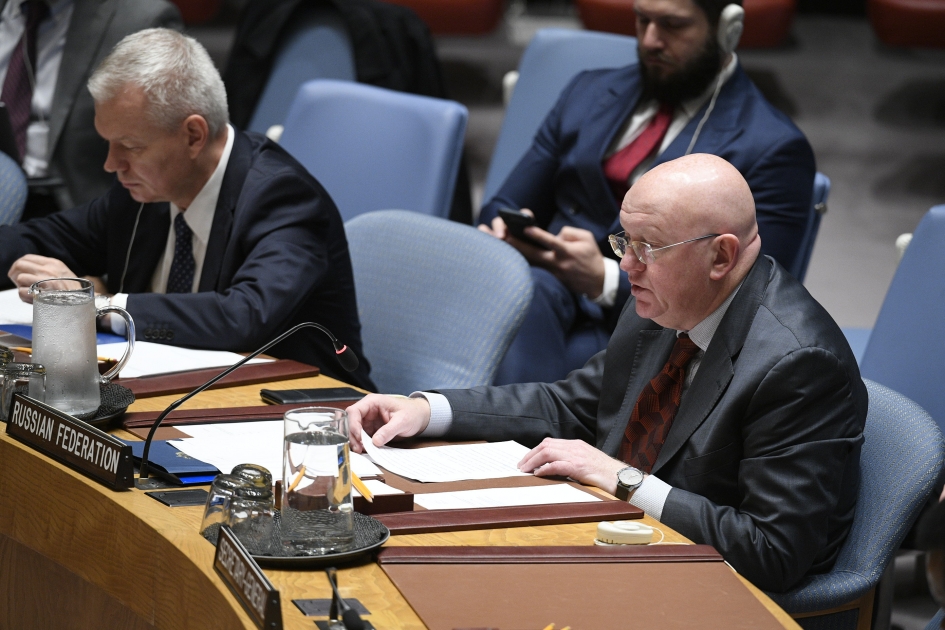Statement by Permanent Representative Vassily Nebenzia at the UN Security Council Meeting on Colombia
Thank you, Mr.President,
We welcome Minister of Foreign Affairs of Colombia Carlos Holmes Trujillo and Counsellor to the President of Colombia for Stabilisation and Consolidation Emilio Archila who found an opportunity to attend this meeting personally. We also thank Special Representative of the Secretary-General Carlos Ruiz Massieu for his briefing.
We agree with our colleagues who said that peace process in Colombia has entered a crucial stage. We appreciate contribution of the United Nations Verification Mission in Colombia to post-conflict peacebuilding in the country. We know that UN support is very welcome among all key stakeholders in Colombia, including government, participants of peace process, indigenous peoples and civil society at large. This proves that Colombia trusts the international personnel and its objectiveness.
At the same time, the main responsibility for the peace process rests solely with Colombians and, judging by what we heard today, though there have been some progress, the major bulk of work is yet to be done.
Return of some participants of peace process to armed struggle shows that not everybody is content with the pace of implementation of the Final Peace Agreement. The Secretary-General warned about such risks in his previous reports. As of now, 8000 participants of peace process are reported to be in the risk group. The situation instills growing concerns and proves once again that peace is not irreversible.
However, we insist that armed confrontation is unacceptable – public consensus can only be achieved through a broad dialogue without any preconditions and within the legal framework. Use of violence in order to solve political contradictions is inadmissible.
This can be fully applied to the pre-election situation. We cannot but be concerned about the information contained in the report that over the report period 54 cases of electoral violence have been registered, including 7 murders, 5 assaults, 2 abductions, and 40 life threats.
Apart from emerging new challenges for the Colombian peace process, there remain tasks that require urgent resolution. A tangled set of problems has to do with ensuring security of peace process participants and civil activists. They can be solved if State authorities enhance their presence in remote areas of the country.
We need progress in humanitarian mining action, agricultural reforms – a key element of the peace process – and in implementing crop substitution programs.
It is vital to advance people’s trust in the peace process. This can be solved through active promotion of legal, social and economic, political reintegration of former combatants, and their employment. In this context, we share the ideas presented in the Joint communique of Cuba and Norway – guarantors of Colombian peace talks – dated 30 August.
What creates extra difficulties is the decision to stop negotiations and get back to forceful action against rebels from the “National Liberation Army” after the terrorist attack of 17 January. We condemn this act in strongest terms, however we are convinced that without dialogue with this group, true peace cannot be achieved in Colombia.
We call to resolve disputes with Cuba with regard to negotiators who are in the country at the moment and observe the “guarantee protocols” signed by the parties.
In general, we would like to stress once again that there is one prerequisite for peace consolidation in the country – all sides in Colombia have to fully comply with their obligations under the Final Peace Agreement. We believe it is the task that should remain a priority for the government and be in focus of public discussion.
We express our total support for the call by the Secretary-General to solve all contradictions in the framework of existing legal mechanisms, while any new legislative mechanisms should be subject to a broad public discussion. It is the only way to achieve gradual, step-by-step consolidation of the society, which will ultimately consolidate peace.
As for opinions about external factors affecting Colombian peace process, we proceed from the fact that it were Colombians themselves who managed to come up with key peace agreements for the country after decades of internal armed conflict. It were Colombians who accepted national responsibility for the fate of their country and took an obligation to walk the path of peace process. Such commitment to peace made a showcase of responsibility and became something the UN Security Council is very proud of. We expect that this approach will be preserved in the future.
We commend commitments to peace that we hear, however we call not to stop at this point. The international community, the UN and its Security Council, and, most importantly, the people of Colombia expect that the government should strictly observe its obligations. Without that, the armed conflict cannot be considered finished.
We expect that the UN Verification Mission in Colombia will continue playing a significant role in the country’s peace process.
I thank you.
